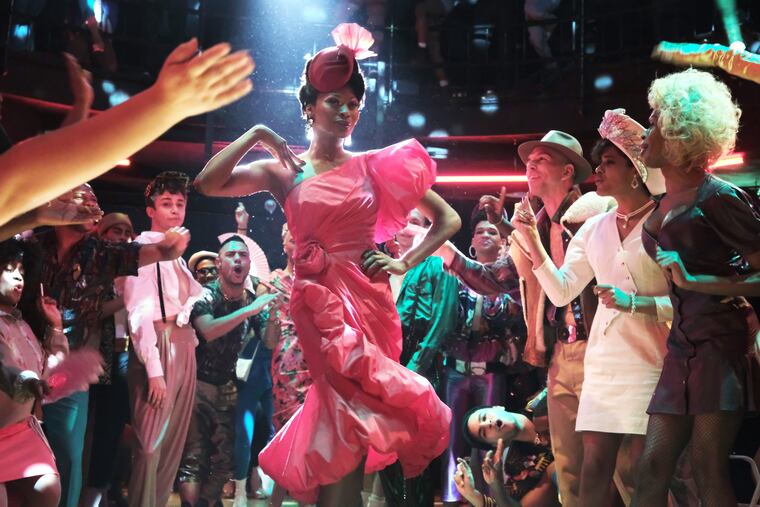Why we should all be watching ‘Pose’ | Elizabeth Wellington
"Pose" is a dance musical that explores the lives of African American and Latina transgender women who struggle during the week working menial jobs and visiting dying friends. But on the weekends, these women command makeshift catwalks in a dusty warehouse turned glamorous ballroom. And in here, with every pose, they are real women. They aren't acting. They aren't playing. They just are.

At the end of every single episode of FX's summer series Pose, I'm left feeling all up in my feelings.
But these misty moments aren't from This is Us-style family drama or love-at-first sight Hallmark channel movies.
Pose is different. Set in late 1980s New York, the show, which airs 9 p.m. Sundays, is a drama that explores the lives of African American and Latina transgender women and gay men. They struggle during the week, working menial jobs, and visiting dying friends. But on the weekends, these women and men command makeshift catwalks in a dusty warehouse turned glamorous ballroom. And in here, with every pose, they walk with families they created themselves. Taking cues from European fashion designers, these families call themselves houses. They don't have to defend the way they identify themselves. They aren't playing. They are competing. They just are.
Pose speaks to me, not because of ballroom life. (To be honest, I have never seen the 1991 documentary Paris Is Burning, which chronicled the ballroom scene.) But I do remember New York in the late 1980s, when hip hop was in its golden age and AIDS was a disease to be reckoned with. This was an era before drug cocktails kept T-cells down and condoms were given out in schools. To be gay, let alone to be trans, was akin to be being the devil himself. Back then, I was nervous teenager. And while my problems weren't in any way comparable to those of people who felt as if they were living in the wrong gender, I was the butt of jokes. I was picked on and I knew what it was like to want to fit in.
The difference is, my story could always be told.
Trans people lived in a world that didn't acknowledge their humanity, so their stories have not and could not be told until recently. And these stories are worth being told. It's important — especially in this political climate that threatens to catapult us back to those mean, intolerant days of yore — that we hear and empathize with these stories now.
The good news is that Pose was renewed last week for its second season. Cocreated by American Horror Story's Ryan Murphy, Pose features the largest cast of trans actors on TV. Among them: MJ Rodriguez as HIV-positive Blanca, the benevolent mother of the House of Evangelista (named for model Linda); Indya Moore as Angel, a dancer and member of the House of Evangelista; and Dominique Jackson, the leader of the House of Evangelista's top rival, the House of Abundance. My favorite is the Pittsburgh-born Tony-winner Billy Porter, who plays the troubled ballroom emcee Pray Tell. To steal a line from one of my best girlfriends, "I want him to announce my life." Because Pray Tell quips such as "Are those pants on sale? Because at my house, they would be 100 percent off," are just priceless.
The one-liners are side-splitting. The music is fantastic (I'm still humming Jodi Watley's "Looking for a New Love" from Sunday's episode). The language is authentic (I want to cheer every time Blanca says, "All of y'all" in perfect black/Latina girl New York dialect). But once you get past the performance drama ("The category is…"), the key to Pose is family.
As the mother of the House of Evangelista, Blanca goes through it. She assembles a family of teens who have been abandoned by their own family because of their sexual orientation. Blanca provides for them by working as a manicurist, gives them a place to live and purpose. Through this season, Blanca, who is forced to leave her own house because her parents didn't accept her, has to figure out how to be a parent. When a house member breaks her rules, she has to learn to discipline. The abandoned is faced with the prospect of being the one who abandons. (Pass me a Kleenex, please.)
Pose also proved to me that no matter how open I think I am, I still have work to do. And, I suspect, I'm not in this boat by myself. It plopped me into a world that although I lived through it, I didn't even know existed. When I got old enough to know it existed — largely through E. Lynn Harris novels — I forgot about it. But this show reminds me that even if I wasn't a part of this world, it has profound effect on how I lived my life. It reminds me that even though we live in a time when gay people can get married, Caitlyn Jenner can come out as trans, and trans models can walk the runway, it wasn't that long ago that these people were not and could not be visible.
The point is that we are actually having these conversations. What happens in the transgender community doesn't happen in an alternate universe. Just ask Pose's Stan Bowes (American Horror Story's master of creepy Evan Peters) who starts to date Angel even though he's a married dad who works for none other than Donald Trump. And here we have an illustration of the down-low lifestyle. It's proof that there is no "them" and "us."
In the end, we are all connected, and that's the point of Pose.